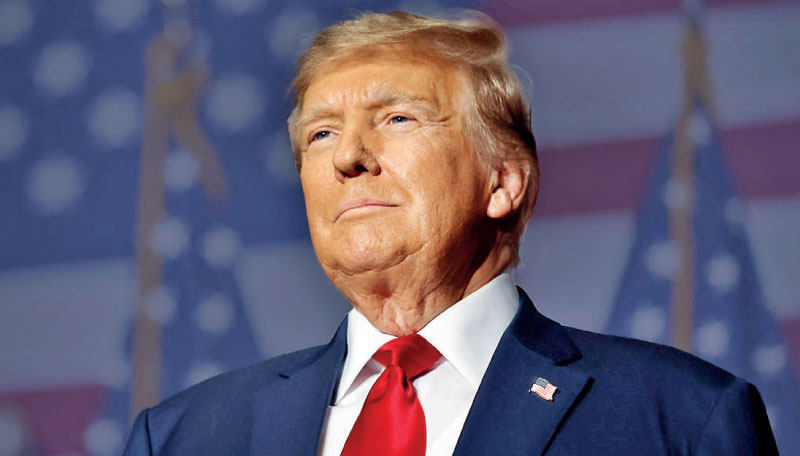Thursday Feb 19, 2026
Thursday Feb 19, 2026
Monday, 21 April 2025 00:22 - - {{hitsCtrl.values.hits}}

Trump’s tariffs were a political performance at odds with economic science
 In a world already shaken by pandemic disruptions and geopolitical tension, US President Donald Trump’s tariff policies stood out for their brazenness and economic idiosyncrasy. Framed under the banner of “reciprocity,” these tariffs were in fact a repudiation of foundational economic theories that have long underpinned global trade.
In a world already shaken by pandemic disruptions and geopolitical tension, US President Donald Trump’s tariff policies stood out for their brazenness and economic idiosyncrasy. Framed under the banner of “reciprocity,” these tariffs were in fact a repudiation of foundational economic theories that have long underpinned global trade.
As someone whose academic foundation and intellectual passion lie in economic theory, I consider it essential to unpack the theoretical underpinnings of trade policy—particularly when such policies diverge so starkly from established principles. Trump’s tariff initiatives, though framed as bold and reciprocal, were in fact economically incoherent. While politically resonant, they contradicted foundational trade theories and inflicted tangible costs on American consumers, firms, and the broader system of global economic cooperation.
1. Comparative advantage (David Ricardo, 1817)
Ricardo’s principle remains one of the most powerful arguments for free trade: nations should specialise in goods where they hold a relative productivity edge and trade for the rest. It results in mutual gains and greater efficiency.
Trump’s contradiction? Imposing tariffs on Chinese electronics, despite China’s comparative advantage in labour-intensive production, meant Americans paid more for phones, TVs, and appliances—products that could have been sourced more cheaply.
Outcome:
2. Heckscher-Ohlin Theory: Misusing factor endowments
This theory suggests nations export goods that intensively use their abundant resources—China exports labour-intensive goods; the US, capital-intensive ones.
Trump’s tariffs ignored this dynamic, forcing misallocation of resources. When a labour-scarce economy like the US tries to produce labour-intensive goods, inefficiency is the inevitable outcome.
3. Tariffs as taxes: Deadweight losses and welfare decline
Tariffs function like a tax—raising prices, reducing consumer surplus, and creating deadweight losses (a pure loss of economic value).
Example:
Trump’s 25% tariff on washing machines in 2018 increased prices by up to $ 86 per unit. Temporary gains in manufacturing were offset by job losses in retail and service sectors.
4. Global Value Chains (GVCs): The Apple example
Modern production is globally fragmented. An iPhone is designed in the US, but components come from over 40 countries and are assembled in China.
Tariffs shattered this model, driving up production costs. Ironically, they made US companies less competitive in the global market—a self-inflicted wound.
5. Game theory and retaliation: A classic prisoner’s dilemma
In Trump’s trade war, retaliatory tariffs from other nations—especially China—deepened the pain.
Example:
China’s response included tariffs on soybeans and automobiles, devastating US farmers. The US government then had to subsidise these farmers with billions in aid—an indirect admission of policy failure.
6. Macroeconomic fallout: Greater than COVID?
The trade war, preceding the pandemic, contributed to:
The IMF and OECD warned these tariffs could shave over 1% off global GDP—an enormous figure in macroeconomic terms.
7. Political economy: Ideology over economics
Why did this happen despite clear economic consensus?
The answer lies in political optics. The “America First” mantra resonated with populist sentiment. Advisors like Peter Navarro revived discredited mercantilist thinking, promoting exports at the expense of imports—despite the fact that imports benefit consumers and enhance productivity.
The broader economic community warned against this, but populism, protectionism, and misinformation prevailed.
Conclusion: An economic own goal
Trump’s tariffs were a political performance at odds with economic science. By rejecting comparative advantage, disrupting GVCs, and escalating trade tensions, these policies did not bring jobs back—they brought costs forward.
For the average American, that meant paying more, not earning more.
As we navigate the future of international trade, let this be a lesson: Economic interdependence is not a weakness—it’s a source of mutual strength. Nationalism may win headlines, but only sound economics wins prosperity.
(The writer is Chief Risk Officer at Mercantile Investments & Finance PLC. He holds a BA Economics, University of Peradeniya, MA in Economics, University of Colombo, MSC in Finance and Investments, University of South Wales – UK, and is Associate Member of ACCA-UK. He can be contacted via [email protected].)